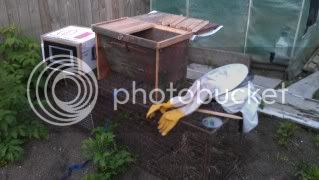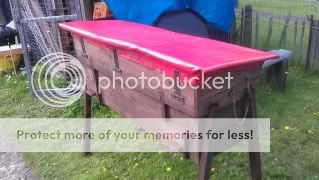... After all, polystyrene is cheap and easy to make isn't it? Yet according to all the sellers I have seen online, they still cost over a hundred. How on earth can they justify this cost?
So it seems I am doomed to want unless my numbers come up. So, how does one start if one is on a budget?
Although the plastic material isn't terribly expensive, it ain't cheap (ultimately its made from oil); because the product has to be much denser than packaging poly for durability, it uses much more plastic than a disposable beaker; and the real biggie is that the big moulds are shockingly expensive (tens of thousands of pounds each) - while production runs are tiny compared to... well plastic beakers being made by the million.
If you think its expensive to start beekeeping, you'd be shocked at how expensive it is to start making poly beehives!
How does one start beekeeping on a cashflow-limited budget?
Firstly, don't even consider premium products.
Make do.
Learn skills that can save money - like basic carpentry assembly. As with cars, the best used bargains will be those that require a bit of work -- refurbishment skills can save lots of money! Doing swarm control with a "swarm board" and spare brood box saves you the expense of having an additional spare floor and roof. Generally, the easier, simpler ways need more kit - but you can substitute skills and effort for the lack of cash.
Borrow or hire expensive items of kit that aren't used much -- prime example: the honey extractor - most Associations have one (or more) for their members. See whether friends will lend spare kit for swarm control rather than covering everything yourself. It may be ratty, but it may be good enough to save you laying out more cash.
Mention should be made of learning the skills of improvisation, so you can make use of what is available, rather than buying in more specialist kit.
And network to hear of bargains/retirements and upgraders so that you can hear (in time) about any goodies becoming available at a reasonable price. Again the Association is the best starting point for this.
And never forget that you don't have to own your own bees to learn the practical skills involved in beekeeping. There are always people looking for a helping hand and eager to share their knowledge. Again... did you guess, start with your local association!






 gets my vote, of course the rent would be HONEY! And here's me with more bee-keeping equipment than I can point a pointy stick at an nowhere to keep bees
gets my vote, of course the rent would be HONEY! And here's me with more bee-keeping equipment than I can point a pointy stick at an nowhere to keep bees

















































 to the forum, onyme - love your avatar
to the forum, onyme - love your avatar